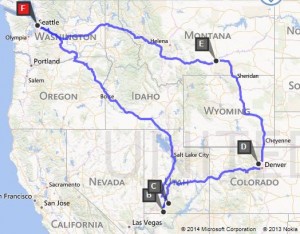Archive for February, 2014
I Sold My Car But Not My Dream
I sold m y car last week. My shiny red Dodge Challenger that showed up when I quit my job.
y car last week. My shiny red Dodge Challenger that showed up when I quit my job.
After I quit, I drove this car down Washington State and across the corners of Oregon and Idaho, and all the way down Utah where I volunteered at the Best Friends Animal Society in Kanab for a few days. Then I drove up through Bryce Canyon and into Colorado to spend a magical month as a writing student in Boulder. When the month was over, I drove up through Wyoming and across Montana and Idaho, back to my home in Washington.
Each day when I got in my car for the next leg of my road trip, I started a playlist that I made for the journey. The first song was the theme from The Dukes of Hazard. “Straightenin’ the curves/ Flatnin’ the hills”….and neither the mountain nor the law got me in that car…not a single ticket or scrape. That car was with me on the best adventure of my life.
The Challenger symbolized the freedom and empowerment I felt when I quit my corporate job. It represented doing what I wanted to do, not what anyone else thought I should do. It was about making a choice not because it was practical but because it added fun and excitement to my life.
In the book I’m writing, I do not recommend quitting your job and then buying a new car! But I had enough savings to afford it and it was an acknowledgement of the confidence I felt. I believed in myself enough to quit my regular paycheck and go out on my own, knowing that I would be fine. My attitude was about saying yes to the possibilities.
It was so much fun to drive the Challenger on freeways and the open roads across the West. It was les s fun to drive in the cramped streets of Seattle, or to navigate around tight corners in parking garages. Challengers are wide cars with long hoods. This car didn’t fit in my garage at home and stayed in the driveway.
s fun to drive in the cramped streets of Seattle, or to navigate around tight corners in parking garages. Challengers are wide cars with long hoods. This car didn’t fit in my garage at home and stayed in the driveway.
In the summer and fall it was still more fun than frustrating. My schedule was wide open and I didn’t drive anywhere on most days. When I did, I could take extra time to find parking spots. Then I started a new consulting gig in January and suddenly needed to be at an office most mornings.
With the winter weather, I had to defrost the car to drive it to the office while my all wheel drive Subaru with its heated seats and rear windshield wipers was blocked behind it in the garage. I kept the Subaru when I bought the Challenger, expecting that it was going to be temporary. I didn’t like owning two cars; it clashed with my values of living more simply and with less consumption.
When the downsides outweighed the positive, I went to the AutoTrader website to evaluate how much the car was worth and found an option to get a price quote from local dealers who buy used cars. I plugged in the details and got an offer that was $900 less than what I purchased the car for back in June. I could take it to the dealership and skip the hassle of placing an ad, meeting people for test drives, and negotiating. It was so simple that I took it as a sign that it was time to let the Challenger go.
Last week I said good bye to the car. I felt like I was taking a beloved pet to find a new home. I had to remind myself that my best memories were from driving the car out to Boulder and back this summer, and that the car was a symbol of living more purposefully. It wasn’t actually freedom itself. I can still make empowering choices that make my life bigger and better.
bye to the car. I felt like I was taking a beloved pet to find a new home. I had to remind myself that my best memories were from driving the car out to Boulder and back this summer, and that the car was a symbol of living more purposefully. It wasn’t actually freedom itself. I can still make empowering choices that make my life bigger and better.
That car represented leaving old crap behind to start a new life, and doing something that was impractical but fun and just for me. I’m so glad I had that experience. And I’m glad I realize I don’t have to keep the car to continue to leave old crap behind, start new adventures, and do things just because they make life more fun.
How to Cope While Plotting to Escape Your Job
I’ve done a lot of research for the book I’m writing about people leaving their jobs to pursue more meaningful work. One of the most interesting things I learned was the various ways that people coped with their unpleasant work situations while they prepared to quit. Here are some of the top coping strategies I heard about:
On your drive into the office each morning, turn up the volume on your car stereo and blast any song that you can yell-sing along with. Repeat on your drive home.
Watch the 1975 movie “Rollerball”. In it, corporations rule the word instead of countries and individualism is squashed by the puppet masters. Marvel that the film is set in 2018.
Join a support group. AA, a church group, a Non-Violent Communications practice group. Anywhere where you are with trusted people that you can talk honestly about your situation. Or go to a counselor. Paying someone $100 to listen to you for an hour might be the best money you’re spending.
Change the settings on your smart phone so that your work email doesn’t automatically sync. Then make a point of not checking it after you’ve left work in the evening and not until you arrive at work the next day. And never on weekends. They have your cell phone number, right? If it is an emergency, they can call you.
Move the icon or tile for your work email to the very bottom of your smart phone, so you can’t see it unless you scroll down or navigate to another page. Psychologically this is a reminder that your workplace isn’t the most important part of your life. Put the higher priority icons or tiles at the top – your contacts, your calendar, your camera and pictures – you look at your phone multiple times a day so let it reinforce your values.
Put yourself first. Running late in the morning? Eat breakfast anyway. It’s your health and your energy. Feeling fatigued at the office? Take ten minutes to visit with a coworker or take a walk around your building. Don’t work at your desk during lunch unless you’re planning to leave work early to compensate. Go sit in the cafeteria and clear your head, go run an errand, or take a nap in your car.
Download a countdown app to your phone and set it for the day that you plan to give notice. Give the countdown a funny name that won’t tip off anyone at the office if they happen to see it. Like “lunch with Michael Scott” (a reference to the head Dunder Mifflin’s Scranton branch from the former tv series “The Office”). Or “Dilbert Festival”. Or “Day of Reckoning”. Every time you feel like screaming at your desk, take out your phone and look at your countdown.
Start taking home the things you care about from your office. Replace them with things you don’t care about, or facsimiles of what was there before. Like my friend who took home the photo he had on his wall but replaced it with a color photo copy.
At home, take an old cardboard box and write “This is the box I’m going to use to carry my stuff home from the office” on the inside with a black sharpie. Put it in your closet or the trunk of your car.
Then every day when you go into the office, smile at your subversive self.
Stepping Off the Treadmill of Ambition
I keep getting emails from Scott Dinsmore with his rallying cry question of “Are you all-in?”
No, I’m not. And I’m fine with that.
I’m editing and fine-tuning my book that I’m committed to publishing. I’m using a chunk of my savings and evenings working through a checklist of tasks to move my startup business forward. I’m spending the majority of my daytime hours on a consulting gig that I recently started, and am devoting energy into delivering top quality results for my client. I started this blog and a professional Facebook page to share my interest in the topic of meaningful work and connect with other people who want to live closer to their values. But I’m not all-in on any of this.
I’m not giving up my sleep, health, or social life because I put a higher value on my day-to-day happiness than launching my startup business faster. I’m not scheduling every half-hour of my week to maximize my productivity because it’s more important to me to have a certain amount of unstructured time. I’m not launching a professional Twitter account because I’d rather unplug from technology when I need a break and I don’t want to feel obligated to respond to tweets every few hours.
Maybe at some point I will turn more attention to these areas of my life, ramping up the hours and energy I spend on them. I might choose to be more active on social media to grow my businesses. Or I might let some activities go so that I can dedicate more effort to my highest priorities. But right now, my soul is guiding me to be a little easier on myself.
For most of my life my M.O. for success was to go all-in on every project I felt responsible for. I powered through when I was tired, sick, and when I’d rather be doing something else. This way of living started in high school, when I stayed up until 3AM if that’s what it took to complete a school project that was due the next day. Nobody encouraged me to do this – I felt compelled to turn in good assignments on time, in the same way that in my later working years I made sure that my deliverables met my bar of quality and met my deadlines.
Looking back at my career, I certainly produced a lot. When I think of the sheer volume of programs, projects, presentations, and materials that I generated in any given year, I feel more surprised than proud, because it seems like I delivered an unrealistic workload. Which is part of the problem that I’ve read and heard about so much in my book research – and I didn’t have to look very far to find it. Company employees are continuously being asked to do more with less. Layoffs happen, budgets are reduced, and the remaining employees don’t just pick up the slack – they work to continue to grow the business. Just today I had a conversation with a woman who often works until 10PM because she’s responsible for the equivalent of two full-time jobs. Like many of us, she feels compelled to give it her best effort, but she also acknowledges that it’s not how she wants to live her life.
When I lived this way it felt like I was plugged into a corporate machine. I was running on adrenaline and there was no way to shut it off. I went from working a bunch of hours in a stress-filled office to coming home late and tuning out until it was time to sleep. And I needed a lot of sleep to be able to get through the days. I know not everyone operates like this, and there are people who can leave work at work, or check out and stop caring, or find other ways to cope. I saw it all: people coping with prescription meds, booze, drugs, or by acting out.
I didn’t want to just cope; I wanted to enjoy my life every day. When I quit my job, I stepped off the treadmill. Life slowed down so much that it was a shocking adjustment to have plenty of energy and many more hours in each day than what was required to work on my book and new business. When you’re used to running at 60 MPH, walking takes some getting used to.
I’m not the only one. I read an article on Tiny Buddha by Joe Scherrer, who wrote about what it was like to step off the treadmill of ambition. In his case, it was a two-month vacation that flushed the adrenaline out of his system and showed him that there is another way of life besides striving for success all of the time. After that experience, he didn’t want to go back to a lifestyle of constantly pushing to get ahead.
I also loved reading Tara Sophia Mohr’s blog post that offers a different perspective on what successful people do before breakfast. There is so much “GO, GO, GO” pressure in American business. Being productive is a need, but it isn’t the only need. Having calm, rest, and pleasure are also needs and they are just as valid.
As much as I like Scott Dinsmore’s advice about how to live up to our dreams, I’m not going all-in at this time. So if I take a weekend off instead of posting on my professional Facebook page or going to a networking event, I get it if some people think I’m not taking the right steps to advance my goals. But I’ve had enough of running the treadmill. This time I’m walking.

Recent Comments